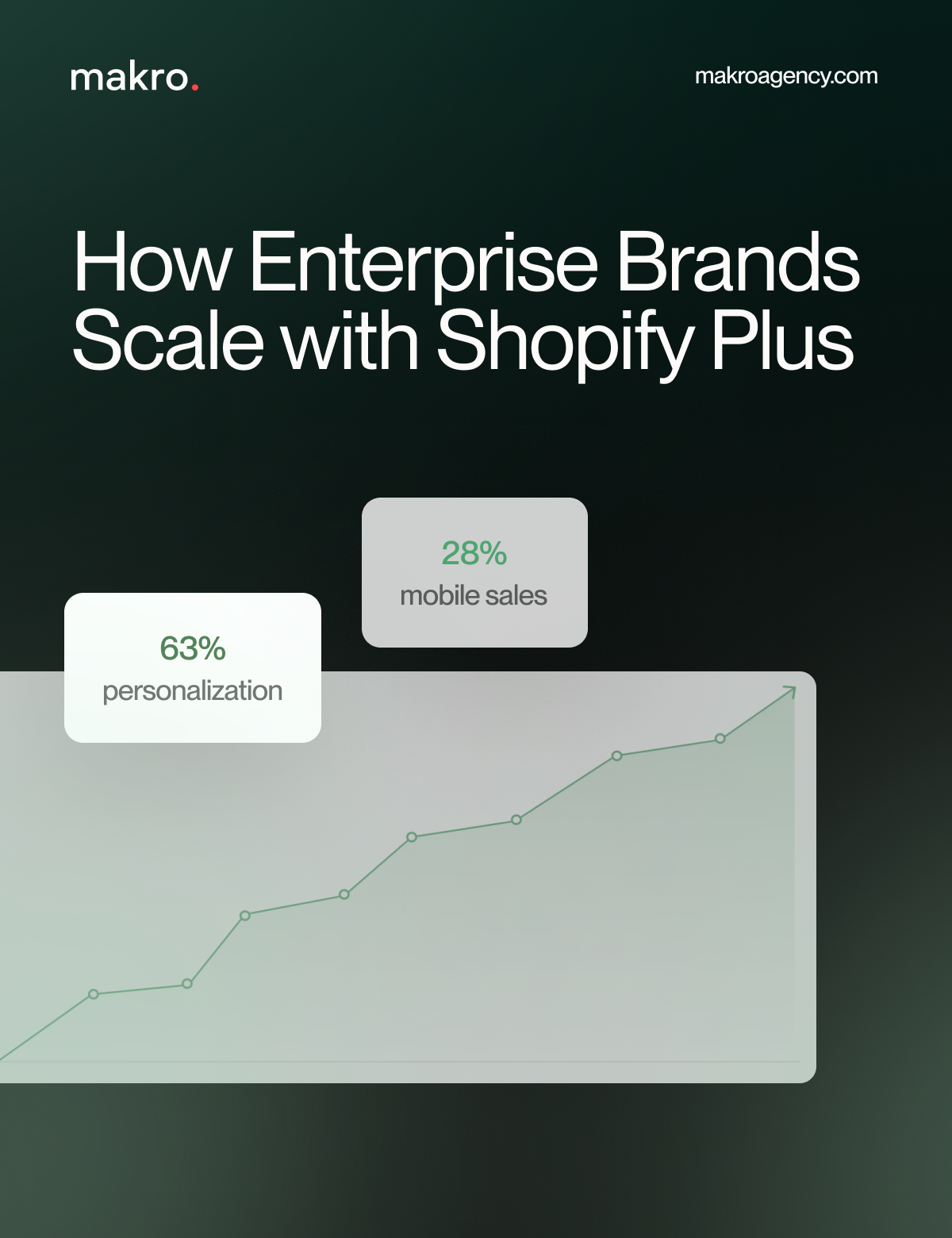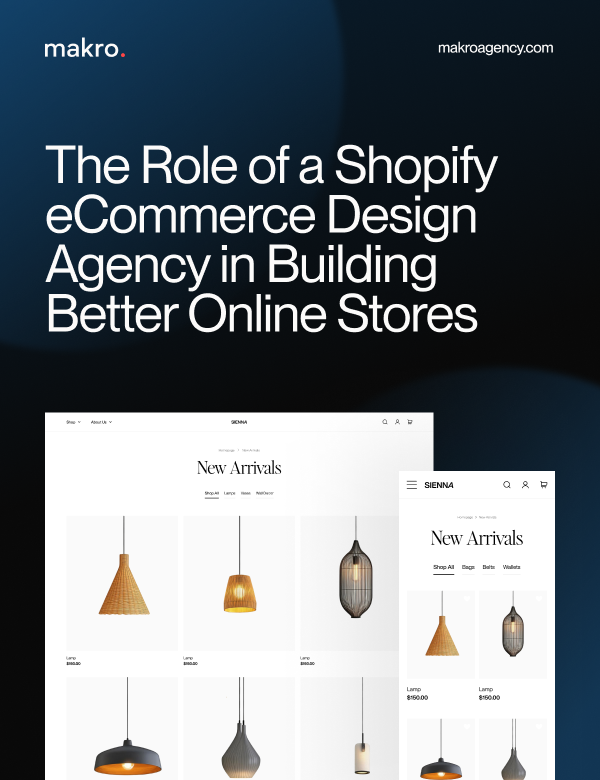How to Use Shopify Scripts to Create Personalized Checkout Experiences at Scale | (Now Called Shopify Functions)
A generic checkout experience simply doesn't cut it. Your buyers expect a seamless, efficient, and, crucially, personalized journey that reflects the unique nuances of your business relationships. As a Shopify Plus merchant, you have a powerful tool at your disposal to achieve this: Shopify Functions (formally called Shopify Scripts).
Often perceived as a purely technical feature, Shopify Functions are, in fact, a strategic asset that can unlock significant value for your B2B operations. They allow you to write custom code that modifies the behavior of your Shopify store in specific areas, most notably the cart and checkout. This opens the door to a level of personalization and automation that standard Shopify settings simply cannot achieve.
At Makro Agency, we understand that while the potential of these Functions is clear, the how can seem daunting for business owners. This blog aims to bridge that gap, demonstrating the technical expertise behind Function development while keeping the focus firmly on the tangible business benefits for your enterprise B2B operation.
Understanding the Power of Personalization in B2B Checkout
Why is a personalized checkout so critical for B2B? Consider these common scenarios:
- Tiered Pricing: Different clients might have negotiated unique pricing structures based on volume, contract terms, or loyalty. A generic checkout will fail to reflect these agreements, leading to errors and friction.
- Custom Shipping Rules: Certain partners might have specific shipping terms, preferred carriers, or even designated delivery windows. A one-size-fits-all approach can lead to logistical nightmares and dissatisfied customers.
- Payment Method Restrictions: Some B2B clients might be limited to specific payment methods due to internal policies or contractual agreements. Presenting irrelevant options adds unnecessary complexity.
- Order Minimums & Maximums: Depending on the client or product category, you might have specific order quantity requirements. Functions can enforce these rules seamlessly.
- Line Item Properties & Custom Attributes: B2B orders often involve intricate details like PO numbers, project codes, or specific customization requests. Functions can help capture and manage this information effectively.
By addressing these nuances through a personalized checkout experience, you can:
- Increase Conversion Rates: A smooth, tailored checkout reduces cart abandonment and encourages repeat purchases.
- Strengthen Customer Relationships: Showing that you understand and cater to their specific needs fosters trust and loyalty.
- Improve Operational Efficiency: Automating these personalized rules reduces manual intervention and minimizes errors.
- Enhance the Overall Customer Experience: A frictionless checkout contributes significantly to a positive perception of your brand.
How Shopify Functions Work: A Technical Overview for Business Minds
Shopify Functions operate at the backend of your store, executing custom code in real-time as a customer interacts with their cart and proceeds to checkout. They can modify various aspects, including:
- Line Items: Adjusting prices, applying discounts, and adding/removing items.
- Shipping Rates: Showing, hiding, or modifying shipping options and costs.
- Payment Gateways: Displaying or restricting available payment methods.
It's crucial to understand that these Functions run on Shopify's servers before the customer reaches the final payment stage. This ensures that the information presented is accurate and reflects the agreed-upon terms.
Think of Shopify Functions as intelligent rules that automatically adapt the checkout flow based on specific conditions. These conditions can include:
- Customer Tags: Identifying specific customer segments or individual clients.
- Product Attributes: Recognizing specific items in the cart.
- Cart Contents: Analyzing the quantity or value of items being purchased.
- Shipping Address: Determining the destination for delivery.
Concrete Examples: Personalizing Your B2B Checkout with Functions
Let's illustrate the power of Shopify Functions with some practical B2B scenarios:
1. Implementing Tiered Pricing Based on Customer Tags:
Imagine you have "Gold," "Silver," and "Bronze" tier B2B clients, each entitled to different discount levels. Using Functions, you can automatically apply these discounts based on the customer tag associated with their account.
Ruby
# Discount for Gold tier customersif customer.tags.include?('gold-tier') cart.line_items.each do |item| item.change_line_price(item.line_price * 0.9, message: 'Gold Tier Discount Applied') # 10% discount endelsif customer.tags.include?('silver-tier') cart.line_items.each do |item| item.change_line_price(item.line_price * 0.95, message: 'Silver Tier Discount Applied') # 5% discount endend
Business Benefit: Ensures accurate pricing for each client segment, reducing manual adjustments and potential errors.
2. Offering Custom Shipping Options for Key Accounts:
Suppose a major client has negotiated a specific expedited shipping method with your company. You can use Functions to display only this option for them during checkout.
Ruby
# Show "Priority Express" shipping only for customers tagged "key-account"if customer.tags.include?('key-account') shipping_rates = shipping_rates.select { |rate| rate.name == 'Priority Express' }end
Business Benefit: Streamlines the shipping selection process for important clients, ensuring they see only their agreed-upon options.
3. Restricting Payment Methods Based on Customer Type:
Perhaps certain B2B clients are required to pay via purchase order. Functions can be used to hide other payment options for these customers.
Ruby
# Hide credit card payment gateway for customers tagged "po-required"if customer.tags.include?('po-required') payment_gateways = payment_gateways.reject { |gateway| gateway.name.include?('Credit Card') }end
Business Benefit: Enforces payment policies automatically, reducing the risk of payment disputes and simplifying accounting processes.
4. Enforcing Minimum Order Quantities for Specific Products:
If certain products are only sold in bulk, Functions can prevent customers from ordering less than the specified minimum.
Ruby
# Enforce a minimum order quantity of 10 for products with the tag "minimum-10"cart.line_items.each do |item| if item.product.tags.include?('minimum-10') && item.quantity < 10 item.change_quantity(10, message: 'Minimum order quantity of 10 applies to this item.') endend
Business Benefit: Ensures efficient inventory management and prevents orders that don't meet your business requirements.
5. Adding Custom Line Item Properties for Purchase Orders:
Functions can enable you to collect essential information like PO numbers directly within the cart.
Ruby
# Add a required "PO Number" line item propertycart.line_items.each do |item| unless item.properties.key?('PO Number') item.change_properties(item.properties.merge('PO Number' => nil), message: 'Please enter your Purchase Order Number.') endend
Business Benefit: Captures crucial order-specific information upfront, streamlining your internal processing.
Scaling Personalization: The Makro Agency Approach
Implementing and managing these Functions effectively at an enterprise B2B scale requires expertise and a strategic approach. At Makro Agency, our Shopify Plus development team brings:
- Deep Technical Proficiency: Our developers are experts in the technology underpinning Shopify Functions, ensuring robust and efficient code.
- Strategic Business Acumen: We work closely with you to understand your specific B2B requirements and translate them into effective Function solutions.
- Scalable Architecture: We design Functions with performance and maintainability in mind, ensuring they can handle your growing transaction volumes.
- Rigorous Testing and Deployment: We follow best practices for testing and deploying Functions to minimize disruption and ensure accuracy.
- Ongoing Support and Optimization: We provide continuous support and proactively identify opportunities to further optimize your personalized checkout experience.
Getting Started with Personalized Checkouts
The journey to a personalized B2B checkout begins with understanding your unique needs and identifying key areas for optimization. Here are some steps to consider:
- Identify Pain Points: Analyze your current checkout process and pinpoint areas where friction or inefficiencies exist for your B2B customers.
- Define Personalization Goals: Determine the specific personalization outcomes you want to achieve (e.g., accurate pricing, tailored shipping, streamlined payments).
- Map Customer Segments and Needs: Understand the different requirements of your various B2B customer groups.
- Consult with Experts: Engage with a Shopify Plus Partner like Makro Agency to discuss your goals and explore the possibilities of Shopify Functions.
- Prioritize Implementation: Start with the personalization efforts that will deliver the most significant impact for your business.
- Test and Iterate: Continuously monitor the performance of your Functions and make adjustments as needed.
Conclusion: Unlock the Potential of Your B2B Checkout
Shopify Functions offer a powerful and flexible way to create truly personalized checkout experiences for your enterprise B2B customers. By moving beyond generic flows and tailoring the experience to their specific needs, you can enhance customer satisfaction, improve operational efficiency, and ultimately drive greater success.
At Makro Agency, we are passionate about helping Shopify Plus merchants like you unlock the full potential of their platform. Contact us today to explore how our technical expertise in Shopify Functions can transform your B2B checkout and elevate your customer relationships to the next level. Let's build a checkout experience that truly reflects the value you offer your partners.











.png)
.png)





















































.png)

.png)



.png)

.png)


